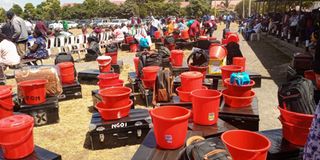All 2022 KCPE pupils transitioned to Secondary School, CS Machogu says

Form one students queuing for admission at Kapsabet Boys High school in Nandi County. All pupils who sat 2022 KCPE have transitioned from primary school with Sh16b already disbursed to Secondary Schools.
All pupils who sat 2022 KCPE have transitioned from primary to Secondary Schools, Education Cabinet Secretary Ezekiel Machogu has said. He has also directed secondary schools not to turn away needy Form One students over lack of fees and other requirements.
The CS asked school heads to desist from imposing additional levies on parents. He insisted that no child should remain at home because there were enough vacancies for pupils joining secondary school and said that the government would continue with its 100 per cent transition policy at the basic level.
He urged the schools to give parents leeway to be able to purchase uniforms.
“Where parents cannot buy the uniforms immediately, they should be given time so that the child can come with the uniform that they used in primary school, and use it for the time being while parents make arrangements for new ones,” he said.
While monitoring Form One reporting at St George’s Girls in Nairobi, Mr Machogu expressed his satisfaction with the first day of exercise saying that county and regional directors were also reporting a smooth admission process.
Capitation for learners
Mr Machogu revealed that the government last week disbursed Sh16 billion to about 10,000 secondary schools across the country.
The Ministry had earlier reported that capitation for learners at secondary school level will remain at Sh22,244 with Sh4 billion already disbursed to primary schools.
“We also sent about Sh4 billion for primary school learners, the only funds that have not been sent are those of Junior Secondary School (JSS) but the money is available from the National Treasury,” he said.
He attributed the delay to inadequate data on the number of registered JSS learners per school citing the fact that not all primary schools had qualified to host JSS. Once the information is received, which he stated to be end of this week, JSS would begin to get Sh 15,042 capitation for each student.
He reiterated that JSS managers should establish separate bank accounts from their primary sections as outlined in an interim set of guidelines provided by the Ministry to prevent a mix-up of the funds.
Amidst concerns that JSS students who reported to public schools on January 30 had lost a week of learning due to unavailability of teachers, the CS assured parents that the Teachers Service Commission (TSC) had already deployed tutors to schools.
“The curriculum will be adequately covered within the stipulated timelines may it be in public or private because the 36,000 new employed teachers should be reporting in the course of the week and latest by next week,” he said.
He rubbished claims that there was a shortage of classrooms in primary schools hosting JSS or that students were learning under trees adding that the focus of the government was on building laboratories.
“We are also going to come up with integrated rooms for Physics, Biology and Chemistry and we are partnering with the World Bank to construct 8,000 such rooms. We are also asking our members of parliament to prioritise building labs when allocating CDF funds,” said Mr Machogu.
Aside from the newly employed teachers, he said that there will be other graduate teachers in primary schools who will be upgraded to facilitate JSS learning.





